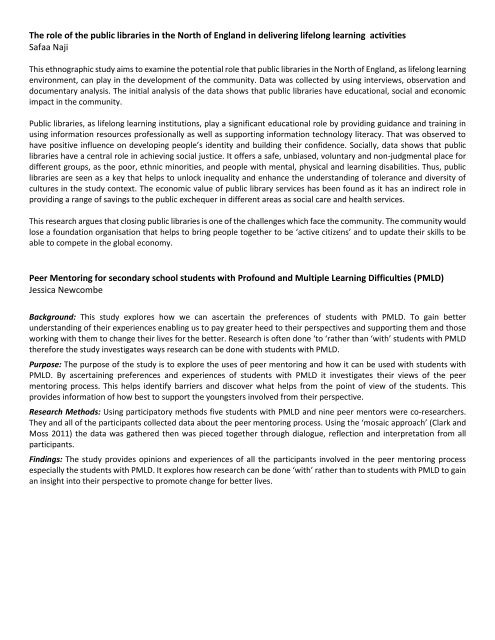Conference Programme FULL (1)
You also want an ePaper? Increase the reach of your titles
YUMPU automatically turns print PDFs into web optimized ePapers that Google loves.
The role of the public libraries in the North of England in delivering lifelong learning activities<br />
Safaa Naji<br />
This ethnographic study aims to examine the potential role that public libraries in the North of England, as lifelong learning<br />
environment, can play in the development of the community. Data was collected by using interviews, observation and<br />
documentary analysis. The initial analysis of the data shows that public libraries have educational, social and economic<br />
impact in the community.<br />
Public libraries, as lifelong learning institutions, play a significant educational role by providing guidance and training in<br />
using information resources professionally as well as supporting information technology literacy. That was observed to<br />
have positive influence on developing people’s identity and building their confidence. Socially, data shows that public<br />
libraries have a central role in achieving social justice. It offers a safe, unbiased, voluntary and non-judgmental place for<br />
different groups, as the poor, ethnic minorities, and people with mental, physical and learning disabilities. Thus, public<br />
libraries are seen as a key that helps to unlock inequality and enhance the understanding of tolerance and diversity of<br />
cultures in the study context. The economic value of public library services has been found as it has an indirect role in<br />
providing a range of savings to the public exchequer in different areas as social care and health services.<br />
This research argues that closing public libraries is one of the challenges which face the community. The community would<br />
lose a foundation organisation that helps to bring people together to be ‘active citizens’ and to update their skills to be<br />
able to compete in the global economy.<br />
Peer Mentoring for secondary school students with Profound and Multiple Learning Difficulties (PMLD)<br />
Jessica Newcombe<br />
Background: This study explores how we can ascertain the preferences of students with PMLD. To gain better<br />
understanding of their experiences enabling us to pay greater heed to their perspectives and supporting them and those<br />
working with them to change their lives for the better. Research is often done ‘to ‘rather than ‘with’ students with PMLD<br />
therefore the study investigates ways research can be done with students with PMLD.<br />
Purpose: The purpose of the study is to explore the uses of peer mentoring and how it can be used with students with<br />
PMLD. By ascertaining preferences and experiences of students with PMLD it investigates their views of the peer<br />
mentoring process. This helps identify barriers and discover what helps from the point of view of the students. This<br />
provides information of how best to support the youngsters involved from their perspective.<br />
Research Methods: Using participatory methods five students with PMLD and nine peer mentors were co-researchers.<br />
They and all of the participants collected data about the peer mentoring process. Using the ‘mosaic approach’ (Clark and<br />
Moss 2011) the data was gathered then was pieced together through dialogue, reflection and interpretation from all<br />
participants.<br />
Findings: The study provides opinions and experiences of all the participants involved in the peer mentoring process<br />
especially the students with PMLD. It explores how research can be done ‘with’ rather than to students with PMLD to gain<br />
an insight into their perspective to promote change for better lives.


